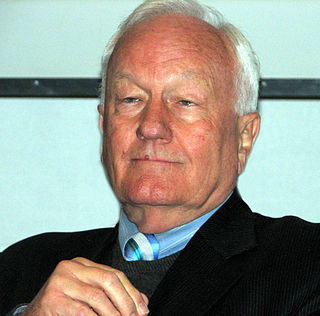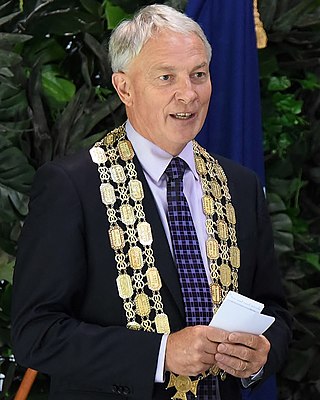| ||||||||||
| ||||||||||
| ||||||||||
The 1996 New Zealand Labour Party leadership election was intended to determine the future leadership of the New Zealand Labour Party. The leadership was retained by Mount Albert MP Helen Clark, who was the incumbent leader.
| ||||||||||
| ||||||||||
| ||||||||||
The 1996 New Zealand Labour Party leadership election was intended to determine the future leadership of the New Zealand Labour Party. The leadership was retained by Mount Albert MP Helen Clark, who was the incumbent leader.
Despite unseating Mike Moore from the leadership Labour struggled against New Zealand First and the Alliance, after being already behind both National and the Alliance in numerous polls throughout 1995. By early 1996, it still continuously polling poorly, with some showing support below 20%. Labour was still associated with its unpopular Rogernomics image from the 1980s - which Clark was seeking to jettison. [1] This was part of a wider divide inside Labour between its drastically differing left and right factions. Clark was of the left-leaning faction, attempting to restore Labour to it social-democratic roots, while those on the right-wing of Labour (such as Goff) were intent on retaining the deregulation and free trade policies of the 1980s, albeit more moderately. [2]
Clark had led Labour for nearly three years since her own leadership challenge in 1993 against Mike Moore. [3] She proved very unpopular in the country at the time and, at one point, had approval ratings of two percent nationally, but was seen regarded as a colossus within the Labour party itself by Goff and his allies. Clark had yet to connect with voters seeming aloof and wooden. Her widely acknowledged intelligence came across more as arrogance than aptitude. [2]
Goff had been a cabinet minister for the entirety of the Fourth Labour Government, actually having more cabinet experience than Clark, who only became a minister in 1987. He was currently serving as the Shadow Minister of Justice under Clark. [4] However, Goff was largely unknown, a dangerous factor only months from an election coupled with his hardline reputation as a Rogernomics-era Minister (something Goff had vigorously supported), an image Labour was trying to shake. This caused many fence sitters to remain with the status-quo, fearing voter backlash. [2]
After losing the leadership to Clark, Moore had strongly considered forming a break-away party, the New Zealand Democratic Coalition with Geoff Braybrooke for the new MMP era, but then decided against it. A couple of Maori MPs told Goff's lieutenants they were willing to vote against Clark, but for Moore rather than Goff. [2]
A delegation of Goff and Labour frontbenchers Annette King, Michael Cullen, Jim Sutton and Koro Wētere met with Clark in her office prior to a caucus meeting persuading her to stand down and informing her (in a ruse) that they had the numbers to oust her if she refused. [2] Clark had been prepared for it and had already mobilised her own allies, her deputy David Caygill, Trevor Mallard, Steve Maharey and whip Jonathan Hunt. They had assured her that there were enough MPs loyal to her that the challenge could be averted. [5] Clark stared Goff and his supporters down and ultimately remained leader. [2]
Over the period Caygill had been privately contemplating retiring from politics. On 7 June he informed Clark of his decision to stand down. On 11 June Caygill announced his retirement to a surprised caucus where Cullen was elected the new deputy leader unopposed. Only a day earlier the five frontbench MPs who had confronted Clark had said they wouldn't push for a leadership vote. Caygill said there had been no pressure on him to quit and hoped it would provide the "circuit-breaker" to Labour's troubles. [6] Moore, who still held leadership ambitions, refused to comment on the positional change, saying only that he did not contest the deputy leadership because he was "a leader, not a deputy". [7]
Clark would lead Labour until she resigned in 2008. Clark was advised by her allies to demote Goff, but she chose not to. As feared, Labour lost the 1996 election, but did better than many earlier polls indicated. Clark would go on to win three consecutively (Labour's best showing since their first government) in 1999, 2002 and 2005. Goff would eventually become leader in 2008 when Clark resigned following that year's election.
As Goff had hosted a barbeque for his colleagues during the planning stage of the leadership challenge the term "BBQ" became a code word in New Zealand from then on for leadership coups. [8]

Michael Kenneth Moore was a New Zealand politician, union organiser, and author. In the Fourth Labour Government he served in several portfolios including minister of foreign affairs, and was the 34th prime minister of New Zealand for 59 days before the 1990 general election elected a new parliament. Following Labour's defeat in that election, Moore served as Leader of the Opposition until the 1993 election, after which Helen Clark successfully challenged him for the Labour Party leadership.
Rogernomics were the neoliberal economic reforms promoted by Roger Douglas, the Minister of Finance between 1984 and 1988 in the Fourth Labour Government of New Zealand. Rogernomics featured market-led restructuring and deregulation and the control of inflation through tight monetary policy, accompanied by a floating exchange-rate and reductions in the fiscal deficit.

Sir Roger Owen Douglas is a retired New Zealand politician who served as a minister in two Labour governments. He became best known for his prominent role in New Zealand's radical economic restructuring in the 1980s, when the Fourth Labour Government's economic policy became known as "Rogernomics".

James Patrick Anderton was a New Zealand politician who led a succession of left-wing parties after leaving the Labour Party in 1989.

Sir Michael John Cullen was a New Zealand politician. He served as the 16th deputy prime minister of New Zealand, also as the minister of Finance, minister of Tertiary Education, and attorney-general. He was the deputy leader of the Labour Party from 1996 until November 2008, when he resigned following a defeat in the general election. He resigned from Parliament in April 2009, to become the deputy chairman of New Zealand Post from 1 November 2009 and chairman from 1 November 2010 until leaving the role in 2016. On 6 March 2020 he announced that he had resigned from the Lakes and Bay of Plenty district health boards, respectively. At the same time he also announced that he had been diagnosed with stage 4 small-cell lung cancer, which had also spread to his liver.

Philip Bruce Goff is a New Zealand politician and diplomat. He currently serves as High Commissioner of New Zealand to the United Kingdom since 2023. He was a member of the New Zealand Parliament from 1981 to 1990 and again from 1993 to 2016. He served as leader of the Labour Party and leader of the Opposition between 11 November 2008 and 13 December 2011.

Dame Annette Faye King is a former New Zealand politician. She served as Deputy Leader of the New Zealand Labour Party and Deputy Leader of the Opposition from 2008 to 2011, and from 2014 until 1 March 2017. She was a Cabinet Minister in the Fourth and Fifth Labour Governments, and was the MP for the Rongotai electorate in Wellington from 1996 to 2017.
Jack Arnold Elder is a New Zealand former politician. He was an MP from 1984 to 1999, representing the Labour Party, New Zealand First and Mauri Pacific.

David Francis Caygill is a former New Zealand politician. Caygill was born and raised in Christchurch. He entered politics in 1971 as Christchurch's youngest city councillor at the age of 22. He served as a Member of Parliament (MP) from 1978 to 1996, representing the Labour Party. A supporter of Rogernomics, he served as Minister of Finance between 1988 and 1990. From 2010 to 2019, he was one of the government-appointed commissioners at Environment Canterbury.

Koro Tainui Wētere was a New Zealand politician. He was an MP from 1969 to 1996, representing the Labour Party. He served as Minister of Māori Affairs in the Fourth Labour Government (1984–1990).

Helen Elizabeth Clark is a New Zealand politician who served as the 37th prime minister of New Zealand from 1999 to 2008, and was the administrator of the United Nations Development Programme from 2009 to 2017. She was New Zealand's fifth-longest-serving prime minister, and the second woman to hold that office.
The 2011 New Zealand Labour Party leadership election was held on 13 December 2011 to choose the thirteenth Leader of the New Zealand Labour Party. A Deputy Leader and a senior and a junior whip were also elected. Following the Labour Party's loss in the 2011 general election, leader Phil Goff and deputy leader Annette King resigned, prompting the leadership election, which was conducted as a secret ballot of the Labour caucus.
Andrew Little assembled a shadow cabinet after he was elected Leader of the Labour Party in New Zealand. He composed this of individuals who acted for the party as spokespeople in assigned roles while he was Leader of the Opposition (2014–17). As the Labour Party formed the largest party not in government, this Frontbench team was as a result the Official Opposition of the New Zealand House of Representatives.
The 1993 New Zealand Labour Party leadership election was held to determine the leadership of the New Zealand Labour Party. The leadership was won by Mount Albert MP Helen Clark, who had been Deputy Leader of the party since 1989.
New Zealand political leader Bill Rowling assembled a shadow cabinet system amongst the Labour caucus following his position change to Leader of the Opposition in 1975. He composed this of individuals who acted for the party as spokespeople in assigned roles while he was leader (1975–83).
The 1988 New Zealand Labour Party leadership election was held on 21 December 1988. The incumbent leader of the New Zealand Labour Party David Lange was re-elected with 72% of the vote. To date it is the only instance when a sitting Prime Minister has been challenged for leadership in a caucus vote.
The 1990 New Zealand Labour Party leadership election was held on 4 September to determine the leadership of the New Zealand Labour Party. The leadership was won by Christchurch North MP Mike Moore.

The 2008 New Zealand Labour Party leadership election was held on 11 November 2008 to choose the twelfth Leader of the New Zealand Labour Party. Phil Goff, who had served continuously as an MP since the 1993 election, unanimously won the election with no other MPs putting themselves forward. Annette King became the Deputy Leader. She was first elected to parliament in the 1984 election, three years after Goff.
New Zealand political leader Helen Clark assembled a "shadow cabinet" system amongst the Labour caucus following her election to the position of Leader of the Opposition in 1993. She composed this of individuals who acted for the party as spokespeople in assigned roles while she was Leader of the Opposition (1993–99).

The 1989 New Zealand Labour Party leadership election was held to determine the leadership of the New Zealand Labour Party. The leadership was won by Christchurch Central MP and incumbent deputy leader Geoffrey Palmer.